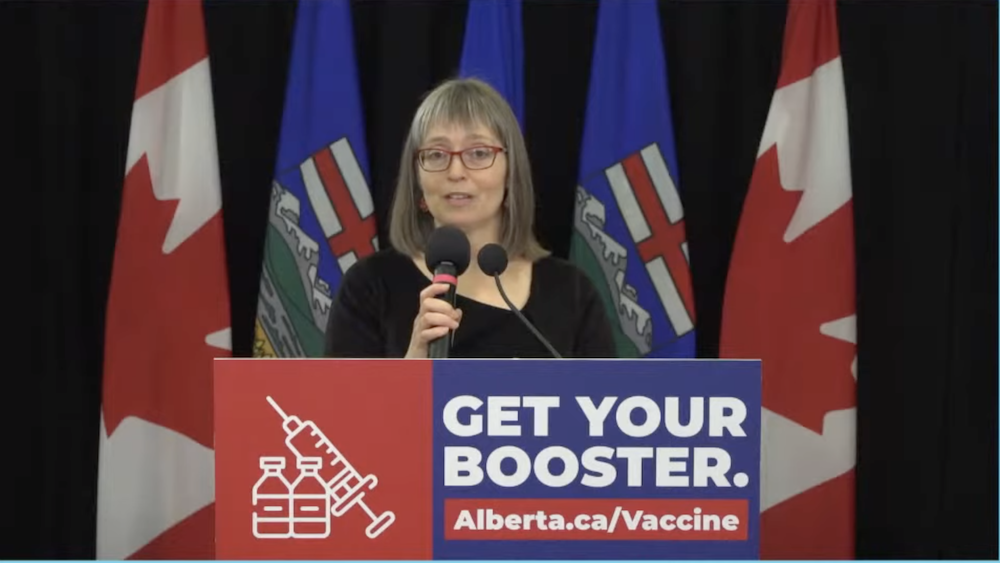Alberta Health Services (AHS) has been ordered by the Kenney government to drop its policy of requiring health care workers to be vaccinated against COVID-19.
“At the direction of Alberta’s government, AHS will provide all unimmunized physicians and staff the option of temporary frequent COVID-19 testing to ensure the anticipated demand on the health-care system caused by the Omicron variant can be met,” said a Dec. 23 news release posted on the Government of Alberta website.
This about-face comes after AHS adopted a policy of requiring all health care workers to be immunized or to face being put on unpaid leave back in August.
Premier Jason Kenney didn’t like that.
The American Republican he is at heart, Kenney likes to brag about how Alberta will never make anyone take a vaccine they don’t want — never mind the danger caused by unvaccinated health care workers.
But then, in the first months of his leadership of the United Conservative Party, long before anyone knew a global pandemic was just over the horizon, he used anti-vaccine sentiment among some Albertans as a wedge against the NDP.
Now after two blunder-filled years as premier, he faces a leadership review in April and can’t afford to further alienate anti-vaccine MLAs in his already rebellious rural caucus who feared AHS’s mandatory vaccination policy might result in health care facilities closing in some of their ridings.
The virulence of the Omicron variant has provided Kenney with a convenient excuse to force AHS to adopt the policy he wanted all along — and help him to solve a political problem of his own creation.
Back on Nov. 29, Heath Minister Jason Copping announced at a news conference that AHS leaders had been overruled and made to drop the mandatory vaccination policy, but only in rural areas where vaccine resistance was high.
“I appreciate the tens of thousands of health-care workers who have made the right choice to get vaccinated,” Copping said at the time, before claiming “this directive is about protecting patient care — primarily in rural areas.”
Responding to reporters at that news conference, AHS CEO Verna Yiu explained politely that “we were prepared to stay our course.”
Her language was diplomatic, but it was clear she wasn’t happy with the cabinet’s interference in the safe operation of health care facilities for political reasons.
“I acknowledge that the introduction of a temporary testing option may frustrate physicians and staff who have made the decision to get immunized, and those feelings are valid,” she observed pointedly.
Copping’s interference meant that while employees in large urban health care facilities had to be vaccinated, those in rural areas didn’t. That created new problems for AHS when urban anti-vaccine employees complained, accurately enough, that they weren’t being treated the same way.
Now the Kenney government is using Omicron as an excuse to fix that problem too — which may make sense from the perspective of labour-relations, Copping’s former portfolio, but is potentially a public health disaster.
While Copping claimed “we stand by the Alberta Health Services workers immunization policy as we have from the start,” it is quite apparent the opposite is true.
Troublingly, it appears Yiu has now been strong-armed into endorsing this latest policy flip-flop.
“We are concerned about the rapid rise in Omicron cases across the province in recent days, and anticipate that it could further impact our health-care system quickly,” Yiu was quoted as saying. “We must ensure we have the staff and resources required to care for our patients.”
Meanwhile, at the same day’s COVID-19 briefing, Chief Medical Officer of Health Deena Hinshaw, flying solo, told a different story — without acknowledging the obvious contradiction.
Alberta is so likely to be overwhelmed by the Omicron variant, Hinshaw explained, that something must be done to ease the burden on provincial labs — which will presumably now be busy processing regular tests for the 1,650 health care employees who had been put on unpaid leave by AHS’s vaccination policy.
For the rest of us, those hard-to-find rapid antigen tests are going to have to suffice.
If you test positive on one, Hinshaw said, it’s your responsibility to isolate yourself and inform anyone you’ve contacted.
Contract tracing will be limited to high-priority settings, she told reporters, and through the holidays there will only be occasional reports on infection rates, on Tuesdays and Thursdays.
If this sounds to you as if the chief medical officer of health and the government have given up on controlling the virus while avoiding transparency on how bad things are getting, you are hardly alone.
Naturally, Hinshaw repeated her call for Albertans to get their third shots of COVID-19 vaccine and reduce their seasonal social contacts.
But when reporters tried to get her to say something critical about Tuesday’s UCP holiday bash in Edmonton, attended by 200 or so United Conservatives a couple of hours after Premier Kenney finished lecturing the rest of us on the need to cut our holiday socializing in half, she would have none of it:
“I think if I were to sit in judgment of everyone who perhaps caused increased risk, I would not have enough hours in the day,” Hinshaw rambled.
“Everyone across this province, we have an opportunity right now, COVID-19 in the form of the Omicron variant is spreading very fast, and in this next week, the choices that we make will have significant consequences not just for us, but for those around us.”



